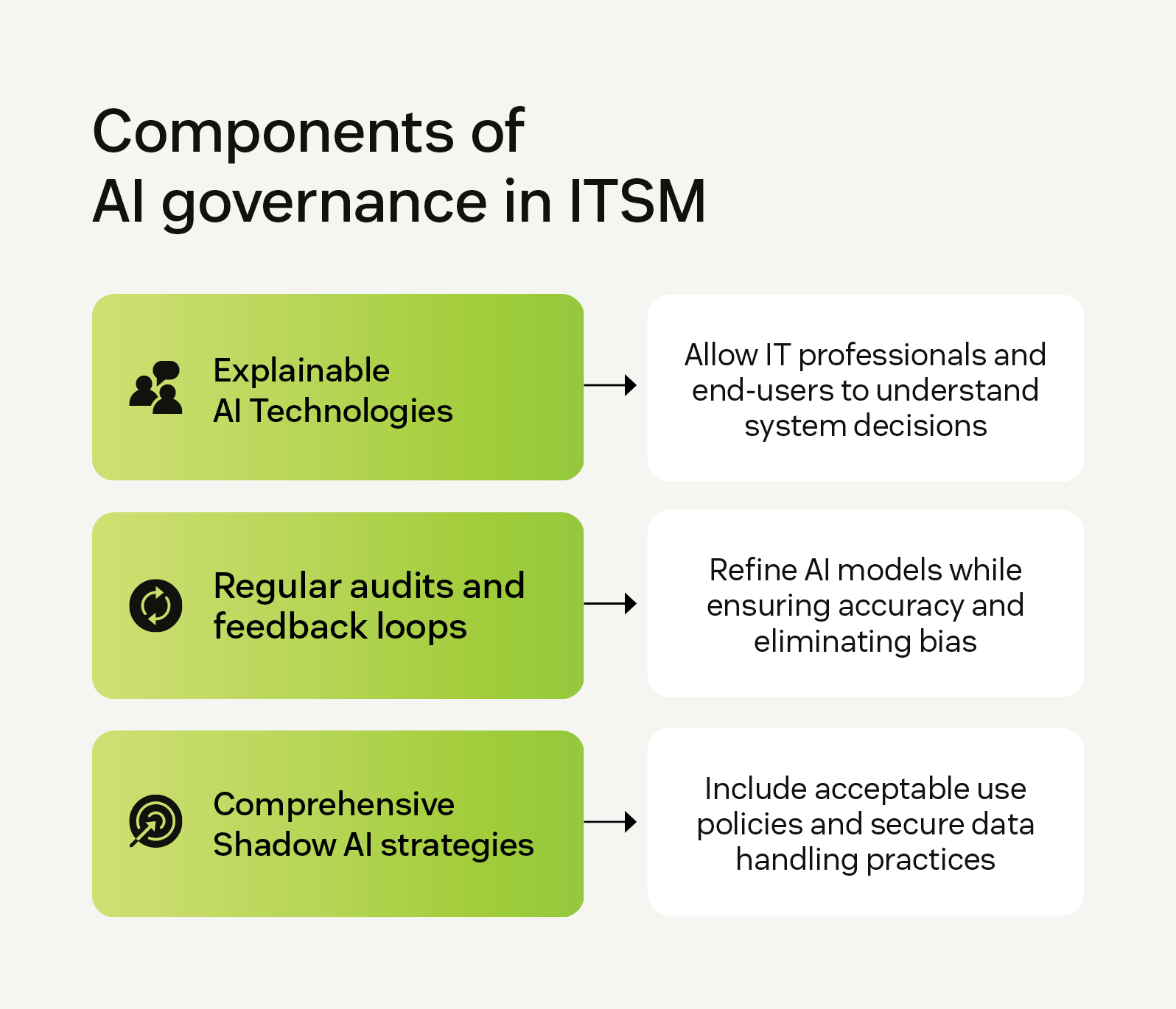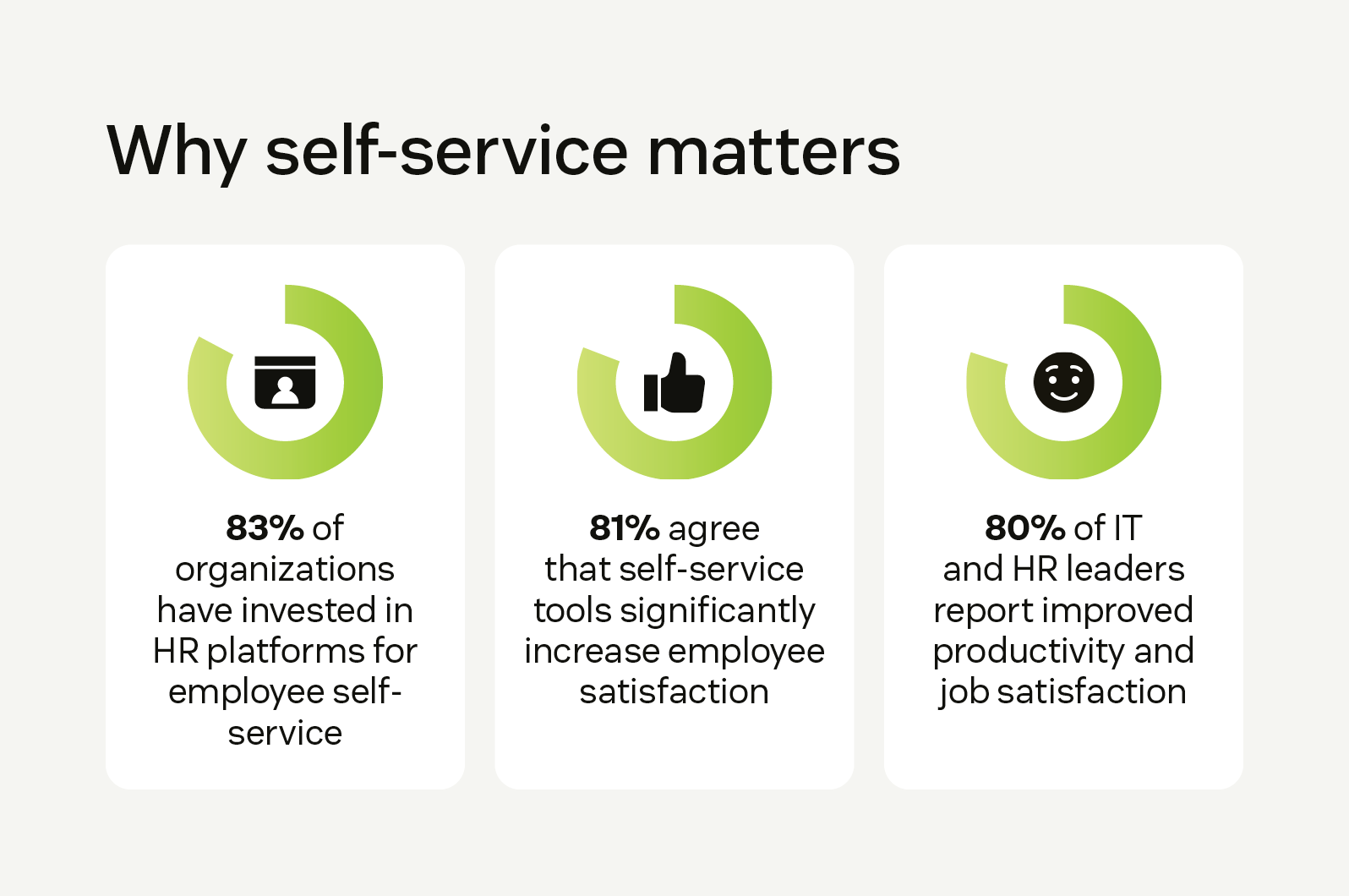Article • 5 min read
Top ITSM trends to watch now
Learn about key ITSM trends to aid your employee service and business productivity in this year and beyond.
Última atualização em January 15, 2026
Your ITSM team is like your phone’s operating system, working quietly in the background to keep everything running smoothly. When it’s doing its job right, you don’t notice it. Apps open instantly, updates happen seamlessly, and things just work. But when it’s slow, outdated, or full of friction, the user experience suffers.
IT service management plays that role, powering everyday tasks like password resets, app access, and support requests through a well-run IT service desk. As systems grow more complex, the need for smarter, faster, and more intuitive support becomes critical for every team, not just IT.
Just like your phone needs the occasional software update to stay efficient, your ITSM strategy needs regular attention too. The latest ITSM trends show a shift toward streamlined support, smarter automation, and better employee experiences. From AI copilots to greener IT practices, these updates help teams work faster, feel supported, and stay focused on what matters most.
More in this guide:
- What is the future of ITSM?
- AI and automation are making ITSM workflows faster and more efficient
- Data security, transparency, and AI governance are a top priority
- Better employee service leads to better customer experiences
- Self-service tools are helping employees solve problems faster
- Sustainability and green ITSM practices are going mainstream
- Improve your ITSM with Zendesk
What is the future of ITSM?
The future of ITSM is becoming increasingly focused on providing human-centric experiences. They’re starting to view every employee interaction, not just IT tickets, as a chance to improve experience and productivity. Here’s what’s changing:
- ITSM platforms are becoming more intuitive, supported by employee experience journey mapping that helps improve every step of the process.
- Businesses are shifting from SLA-focused models to more flexible, outcome-driven service delivery that adapts to individual needs.
- Real-time feedback, sentiment tracking, and intent recognition use natural language processing (NLP) to help IT understand what employees need, even when they can’t describe it perfectly.
Major incident management is getting smarter, with predictive tools that help teams prevent widespread disruptions before they start.
And these numbers from the Zendesk Employee Experience Trends Report speak for themselves:
83% of EX leaders agree that employee experience is a top priority.
84% see it as a key competitive differentiator for retaining top talent.
Employees now expect IT services that adapt to their workflows and needs, not the other way around. When organizations meet those expectations, they can reduce employee turnover and enhance customer satisfaction.
AI and automation are making ITSM workflows faster and more efficient
It’s no surprise that artificial intelligence and automation are now key elements of ITSM, eliminating repetitive tasks and enabling more strategic focus for IT teams. However, two key technologies are taking ITSM to the next level: hyper-automation and agentic AI.
- Hyper-automation combines AI, robotic process automation, machine learning, and intelligent decision engines that streamlines everything from user provisioning to software deployment.
- Agentic AI refers to autonomous software agents that can interpret nuanced requests, make real-time decisions within compliance frameworks, and guide users through tasks naturally across multiple channels, without relying on robotic-sounding scripts.
Gartner predicts that 33 percent of enterprise software applications will include agentic AI by 2028, transforming how IT teams handle service requests.
Beyond these tools, predictive analytics adds another layer of intelligence to ITSM operations. These systems analyze patterns and identify potential issues before they occur, enabling proactive problem resolution that reduces downtime and improves employee satisfaction.
The impact is measurable: 83% of IT and HR leaders report that AI’s decision-making capabilities and increased efficiency have become major highlights of their operations, while nearly 80% note that AI has actually improved the quality of their work (Zendesk EX Trends) |
Data security, transparency, and AI governance are a top priority
With AI playing a larger role in ITSM, the need for responsible governance is front and center. Regulations like the European Union Artificial Intelligence (EU AI) Act set clear risk classification and compliance standards, but internal practices must keep pace.
Despite the urgency, the Zendesk Customer Experience Trends Report 2026 found some significant gaps that remain:
Challenge | Reality |
Shadow AI usage | 250% increase in some industries |
AI privacy and security practices | Only 36% of organizations are actively addressing them |
IT leaders’ awareness of governance needs | 80% recognize its importance |
Businesses that quickly implement safeguards—like explainable AI, policy updates, and internal audits—can gain a competitive advantage while building trust and staying compliant.

The goal is creating frameworks that foster innovation while maintaining security, compliance, and user trust—essential foundations for long-term AI success in ITSM environments.
Better employee service leads to better customer experiences
Our EX Trends Report found that 71 percent of IT and HR leaders acknowledge that the service they receive as consumers exceeds what they experience as employees. That gap reveals a major opportunity: Businesses that prioritize exceptional internal customer service can boost employee satisfaction and, in turn, make customer interactions better.
When employees have reliable IT systems and easy access to support, they can stay focused on their work instead of getting bogged down by tech issues. When they feel supported, that confidence carries over into their work quality.
Modern ITSM platforms are enabling this transformation by providing employees with the same level of service they expect as consumers. The data reveals the impact:
75% of consumers now favor agents using AI to help draft responses. (CX Trends 2026)
20% more likely employees feel empowered when they have AI copilots. (CX Trends 2026)
93% of CX Trendsetters believe copiloting helps customers and agents feel comfortable with AI. (CX Trends 2026)
Eighty percent of IT and HR leaders agree their companies could improve employee experience, suggesting substantial untapped potential for customer experience improvements to carry over. This creates a positive cycle where better internal tools lead to more confident, capable employees who can deliver exceptional customer experiences. This makes employee service investment a strategic imperative rather than just an operational necessity.
Self-service tools are helping employees solve problems faster
Employee expectations for self-service capabilities have reached a tipping point, driven by their experiences as consumers who expect instant access to information and solutions. Organizations are responding by investing heavily in self-service platforms that provide 24/7 support for answers and problem resolution.

With 90 percent of CX Trendsetters believing that 80 percent of issues will be resolved without human intervention within the next few years, having the right employee self-service tools can keep you a step ahead of the competition. Here are just a few:
- AI-powered conversations: Chatbots and virtual assistants understand natural language, provide step-by-step guidance, and initiate complex workflows.
- Comprehensive employee portals: Centralized hubs for benefits enrollment, IT ticket submission, policy access, and request status tracking.
- Interactive visual learning: Video tutorials and guides provide contextual help exactly when needed.
- Mobile-first access: Employees can resolve issues from anywhere, anytime, matching their consumer app expectations.
The result is a dramatic reduction in routine inquiries reaching help desks, allowing IT and HR teams to focus on strategic initiatives while employees gain the independence they crave. These tools represent more than convenience—they’re becoming essential for maintaining productivity in fast-paced work environments.
Sustainability and green ITSM practices are going mainstream
Environmental consciousness is transforming ITSM from a purely operational function into a strategic contributor to organizational sustainability goals. According to EPRI, data center energy demands are projected to consume up to 9 percent of U.S. annual electricity generation by 2030, while cooling systems alone can account for 40 percent of total data center energy consumption.
Businesses are moving beyond traditional disposal methods toward a comprehensive lifecycle management for IT assets:
Reuse and refurbishment programs that extend asset value
Strategic partnerships with certified IT Asset Disposition companies
Integrated tracking within ITAM systems for environmental performance oversight
Modern ITSM strategies prioritize reducing environmental impact through:
- Energy Star-certified device selection as standard practice
Power-saving policies and data center optimization
Renewable energy adoption for IT infrastructure
Advanced technologies are using AI to drive sustainability efforts.
Technology | Application | Benefit |
Predictive Maintenance | Extends equipment lifespans | Reduces resource consumption |
AI optimization | Identifies operational inefficiencies | Minimizes waste and energy use |
Automated monitoring | Tracks sustainability metrics | Supports ESG reporting requirements |
This represents a fundamental shift where sustainability becomes embedded in every ITSM decision rather than becoming a separate initiative. Organizations are discovering that green practices often align with cost savings and operational efficiency, creating win-win scenarios for environmental and business objectives.
Frequently asked questions
Customer story


Indigov
Indigov taps Zendesk for trusted data security
“An important aspect of data privacy and security is meeting and exceeding our customers’ demands, which are always evolving. That’s why we need controls for privacy and security at every level of the business, especially CX.”
Dean Macris
Chief Information Security Officer
Improve your ITSM with Zendesk
ITSM is evolving fast, from AI innovation to sustainable IT practices. Staying competitive means keeping up with ITSM trends and improving your IT service deskby adopting tools that scale, adapt, and meet rising expectations for both employees and customers.
Zendesk offers flexible, cloud-based ITSM solutions designed to support this shift. Whether you’re streamlining workflows, improving service quality, or introducing AI with transparency and care, we offer the tools you need to build better employee experiences that drive real business results.
